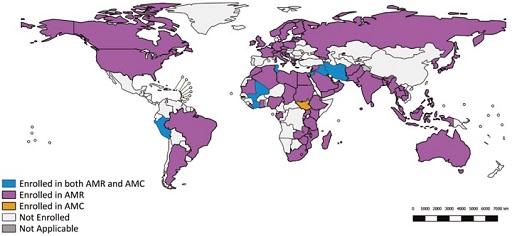6 Global surveillance systems
Global surveillance programmes that monitor antibiotic resistance in specific bacterial pathogens, such as Mycobacterium tuberculosis (Zignol et al., 2016) and Neisseria gonorrhoeae (Wi et al., 2017) have been in place for many years. However, significant gaps remain in the surveillance of many other important bacterial pathogens that cause infections in humans. Addressing this problem and developing common standards for data collection, analysis and sharing at local, national, regional and global levels led to the establishment of the WHO’s GLASS platform in 2015.
As you may recall, the Global Action Plan on AMR recommends that a One Health approach be applied to AMR surveillance (WHO, 2015). GLASS has been designed to progressively incorporate AMR surveillance data, including AMR in the food chain and the environment. GLASS includes a One Health technical module that offers an integrated multi-sector surveillance programme based on the extended-spectrum beta-lactamase (ESBL)-Escherichia coli (‘Tricycle’) project. The Tricycle project was developed by the WHO and the WHO Advisory Group on Integrated Surveillance of Antimicrobial Resistance (AGISAR) in close collaboration with the FAO and the WOAH to promote the development of harmonised surveillance across different sectors in order to inform public health, animal health and global food security.
The goal of GLASS is to enable standardised, comparable and validated data on AMR to be collected, analysed and shared with countries, in order to inform decision-making, drive local, national and regional action, and provide the evidence base for action and advocacy (WHO, 2020).
As of October 2024, 140 countries were enrolled in GLASS (Figure 9). Enrolment does not necessarily mean that the countries have provided AMR data to GLASS, but it does confirm the country is in the process of developing a national AMR surveillance system. Countries who enrol in GLASS are expected to nominate a
5.4 Core surveillance system components as outlined by GLASS





